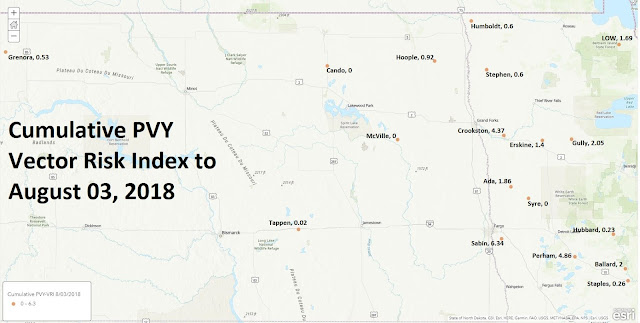Trap Catches Identified to August 3rd
Greetings!
We recovered a total of 130 aphids,120 of which were vector species (15 different species!) from 13 of the 14 sites reporting. Sabin and Perham reported the heaviest flights with 32 and 24 vector aphids respectively.
The number of species recovered in the traps this week was surprising, just about every vector aphid species we monitor was represented. About 1/3 of the aphids captured were small grains aphids; no surprise there, even the latest planted grain is maturing and wheat harvest has begun, so grain aphids are seeking less senescent host plants.
And the opening ceremonies for Sturgis are today (Aug 3) and our little 'biker bugs' are on the move (kudos again to Bruce Potter for coming up with the Sturgis Dispersal Event) and we're starting to see an increase in soybean aphid captures (although nothing like last year). Soybean aphids were captured at Ballard (1), Crookston (1), Humboldt (1), Perham (1), Sabin (4) and Stephen (1) - so we're seeing movement across a broad area. Populations in the soybean fields seems to remain low with only a few locations reporting populations at or above threshold.
We also recovered 2 Green Peach Aphids, one from Sabin and one from Crookston. Other aphids in the mix included Potato, Sunflower, Thistle, Cowpea, and Blackbean aphids. Buckthorn aphids were also a frequent catch being recovered from 8 of the reporting sites.
This mixed assortment might reflect the colder nights we've been having lately. In many species the movement from summer to overwintering hosts is triggered by temperature and photoperiod. Cooler night temperatures can cause the development of a winged generation of adults whose purpose is to disperse back to the overwintering host. Even in species that don't have their overwintering host here (such as green peach aphid), you'll still get those dispersal forms (aphids don't have access to Google Maps, they therefore have no idea their winter host isn't in the neighborhood).
So, numbers aren't that high but lots of different species out there - and they have to land somewhere. So keep an eye on those fields...
As always, keep on scouting!




No comments:
Post a Comment